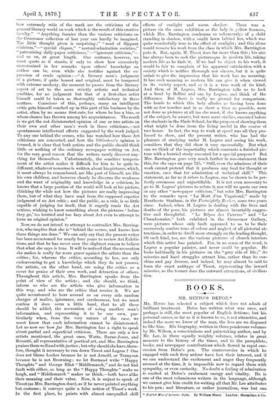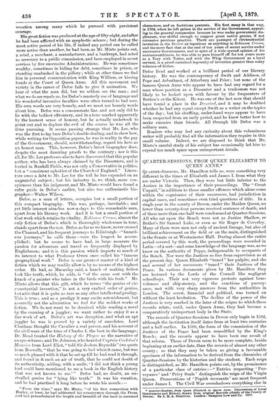BOOKS.
MR. MINTO'S DEFOE.*
MR. MINT° has selected a subject which does not admit of brilliant treatment. Defoe has written what was once, and perhaps is still, the most popular of English fictions ; but his personal career, so far as it is known to us, is not attractive, and indeed the more we know of the man, the less are we disposed to like him. His biography, written in three ponderous volumes. by Mr. Wilson, a conscientious and painstaking author, and by Mr. Lee, in three equally weighty volumes, relates in great measure to the history of the times, and to the pamphlets,. books, and newspaper contributions which flowed in rapid suc- cession from Defoe's pen. The controversies in which he engaged with such fiery ardour have lost their interest, and if we can understand the excitement and anger they frequently aroused at the time, it is impossible now to regard them with sympathy, or even curiosity. No doubt a feeling of admiration is excited at Defoe's exuberant energy and vitality. He is one of the most voluminous writers in the language, although we cannot give him credit for writing all that Mr. Lee attributes to his pen ; and literature, or rather journalism, was but one • English Men of Letters: Defoe. By William Minto. London : Macmillan lc Co. vocation among many which he pursued with persistent courage.
His great fiction was produced at the age of fifty-eight, and after he had been afflicted with an apoplectic seizure ; but during the most active period of his life, if indeed any period can be called more active than another, he had been, as Mr. Minto points out, a rebel, a merchant, a manufacturer, and a bankrupt, had acted .as secretary to a public commission, and been employed in secret services by five successive Administrations. He was sometimes wealthy, sometimes in hiding for debt, sometimes in prison, or standing unabashed in the pillory ; while at other times we find him in personal communication with King William, or kissing hands at the Court of Queen Anne. All this movement and variety in the career of Defoe fails to give it animation. We hear of what the man did, but we seldom see the man ; and what we do see repels ns, for Defoe's masterly nse of language and his wonderful inventive faculties were often turned to bad uses.
His own words are very homely, and we must use homely words about him. Defoe was a consummate liar, and not only did he lie with the boldest effrontery, and in a tone marked apparently by the keenest sense of honour, but he actually undertook to point out and to deplore the evil of the course he was all the time pursuing. It seems passing strange that Mr. Lee, who was the first to lay bare Defoe's double-dealing, and to show how, while writing for Opposition papers, he was in reality in the pay -of the Government, should, notwithstanding, regard his hero as an honest man. This, however, Defoe's latest biographer does, despite the most damning proofs to the contrary ; nor is this all, for Mr. Lee professes also to have discovered that this popular author, who has been always claimed by the Dissenters, and is buried in Bunhill Fields, was not only a Conservative in politics, but a " consistent upholder of the Church of England." Litera- ture owes a debt to Mr. Lee for the toil he has expended on an ungrateful subject ; but his industry is, we think, more con- spicuous than his judgment, and Mr. Minto would have found a safer guide in Defoe's earlier, but also too enthusiastic bio- grapher—Walter Wilson.
Defoe, as a man of letters, occupies but a small portion of this compact biography. This was, perhaps, inevitable; and yet little interest attaches now-a-days to this remarkable man, apart from his literary work. And it is but a small portion of that work which retains its vitality. Robinson Crusoe, almost the only fiction of Defoe's which is thoroughly wholesome in tone, stands apart from the rest. Defoe, as far as we know, never crossed the Channel, and his frequent journeys to Edinburgh—" hazard- ous journeys," he calls them—were the longest he accom- plished ; but he seems to have had, in large measure the passion for adventure and travel so frequently displayed by Englishmen; and it is this passion which imparts so much of its interest to what Professor Owen once called his "famous geographical work." Defoe is our greatest master of a kind of fiction which we may readily allow is by no means of the highest order. He had, as Macaulay said, a knack of making fiction look like truth, which, he adds, is " of the same sort with the knack of a painter who takes in the birds with his fruit." Mr. Minto allows that this gift, which he terms "the genius of cir- cumstantial invention," is not a very exalted order of genius, but adds that it is quite as rare as any other intellectual prodigy. This is true ; and as a prodigy it may excite astonishment, but assuredly not the admiration we feel for the noblest works of fiction. We do not want to be deceived while reading a novel by the cunning of a juggler; we want rather to enjoy it as a fine work of art. Defoe's art was deception, and what an apt juggler he was is proved by a variety of anecdotes. Lord Chatham thought the Cavalier a real person, and his account of the civil wars of the time of Charles I. the best in the language ; Dr. Mead treated the History of the Plague as the narrative of an eye-witness; and Dr. Johnson, who heard of Captain Carleton's Memoirs from Lord Eliot, " told Sir Joshua Reynolds" (we quote from Boswell), " that he was going to bed when it came, but was so much pleased with it that he sat up till he had read it through, and found in it such an air of truth, that he could not doubt of its authenticity, adding, with a smile, ` I did not think a young lord could have mentioned to me a book in the English history that was not known to me.' " Defoe had, no doubt, an un- rivalled genius for " lying like truth." It was his vocation, and he had practised it long before he wrote his novels :— " From the time," says Mr. ][into, "of his first connection with Harley, at least, he had addressed his countrymen through the Press, and had perambulated the length and breadth of the land in assumed characters, and on factitious pretexts. His first essay in that way, in 1704, when he left prison in the service of the Government, appeal- ing to the general compassion because he was under government dis- pleasure, was skilful enough to suggest great native genius, if not extensive previous practice. There are passages of circumstantial invention in the Review as ingenious as anything in Robinson Crusoe, and the mere fact that at the end of ten years of secret service under successive Governments, and in spite of a wide-spread opinion of his untrustworthiness, he was able to pass himself off for ten years more as a Tory with Tories, and with the Whig Government as a loyal servant, is a proof-sustained ingenuity of invention greater than many volumes of fiction.
Defoe lived and worked at a brilliant period of our literary history. He was the contemporary of Swift and Addison, of Pope and Arbuthnot, of Atterbury and Prior; but none of the famous Queen Anne wits appear to have had any regard for a man whose position as a Dissenter and a tradesman was not likely to be looked upon with favour by the frequenters of Button's or the Kitcat. He was one of the last men that should have found a place in the Dunciad, and it may be doubted whether he had any equal except Swift as a writer on the topics of the day ; but his shuffling, under-hand ways appear to have been suspected from an early period, and he knew better how to make enemies than friends. All through life Defoe was a solitary man.
Readers who may feel any curiosity about this voluminous writer will probably find all the information they require in this small volume. Indeed, we are disposed to think that Mr. Minto's careful study of his subject has occasionally led him to expend too much space upon unimportant details.



































 Previous page
Previous page